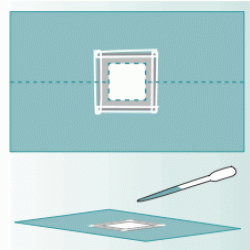Source Institutions
Source Institutions
Add to list Go to activity
Activity link broken? See if it's at the internet archive

In this activity related to microbes, learners use water drops and hand lenses to begin the exploration of magnification. This activity also introduces learners to the microscope. This lesson guide includes background information and handouts.
- 5 to 10 minutes
- 45 to 60 minutes
- $1 - $5 per group of students
- Ages 8 - 14
- Activity, Experiment/Lab Activity, Lesson/Lesson Plan
- English
Quick Guide
Materials List (per group of students)
- 4 hand lenses or magnifiers
- 4 index cards (or similarly sized sections of cardstock)
- 4 pairs of scissors
- 4 pieces of newsprint, about 2 cm x 10 cm each
- 4 pipettes or droppers
- 4 plastic cover slips
- 4 plastic or glass microscope slides
- 4 rulers (measurements in cm)
- Microscope (any kind)
- Other objects to observe, such as a leaf, coin, dollar bill, etc.
- Set of colored pencils or markers
- Sheet of wax paper (6 cm in length)
- Small container of tap water
- Transparent tape
Subjects
-
Engineering and Technology
-
Technology
- Medical Technology
-
Technology
-
Life Sciences
- Cells
-
Diversity of Life
- Viruses and Bacteria
- Protists and Fungi
-
Mathematics
-
Data Analysis and Probability
- Data Analysis
- Data Collection
- Data Representation
-
Measurement
- Size and Scale
-
Data Analysis and Probability
-
Physical Sciences
- Vibration and Waves
-
Light and Optics
- Lenses and Mirrors
- Reflection and Refraction
-
The Nature of Science
-
The Scientific Process
- Conducting Investigations
- Gathering Data
- Formulating Explanations
- Communicating Results
-
The Scientific Process
-
The Nature of Technology
-
Technology and Society
- Impacts of Technology
- Technology and History
-
The Design Process
- Invention and Innovation
-
Technology and Society
Audience
To use this activity, learners need to:
- see
- read
- touch
Learning styles supported:
- Involves teamwork and communication skills
- Involves hands-on or lab activities
Other
Components that are part of this resource:
Includes alignment to state and/or national standards:
Includes assesments for student learning:
- What Do You Know About Microbes? (pre-assessment)
- And Now, What Do You Know About Microbes? (post-assessment)
This resource is part of:
Access Rights:
- Free access
By:
- Moreno, Nancy P. ; Tharp, Barbara Z. ; Erdmann, Deanne B. ; Clayton, Sonia Rahmati ; Denk, James P.
Rights:
- All rights reserved, Baylor College of Medicine, 2008
Funding Source:
- Science Education Partnership Award, 5R25 RR018605
